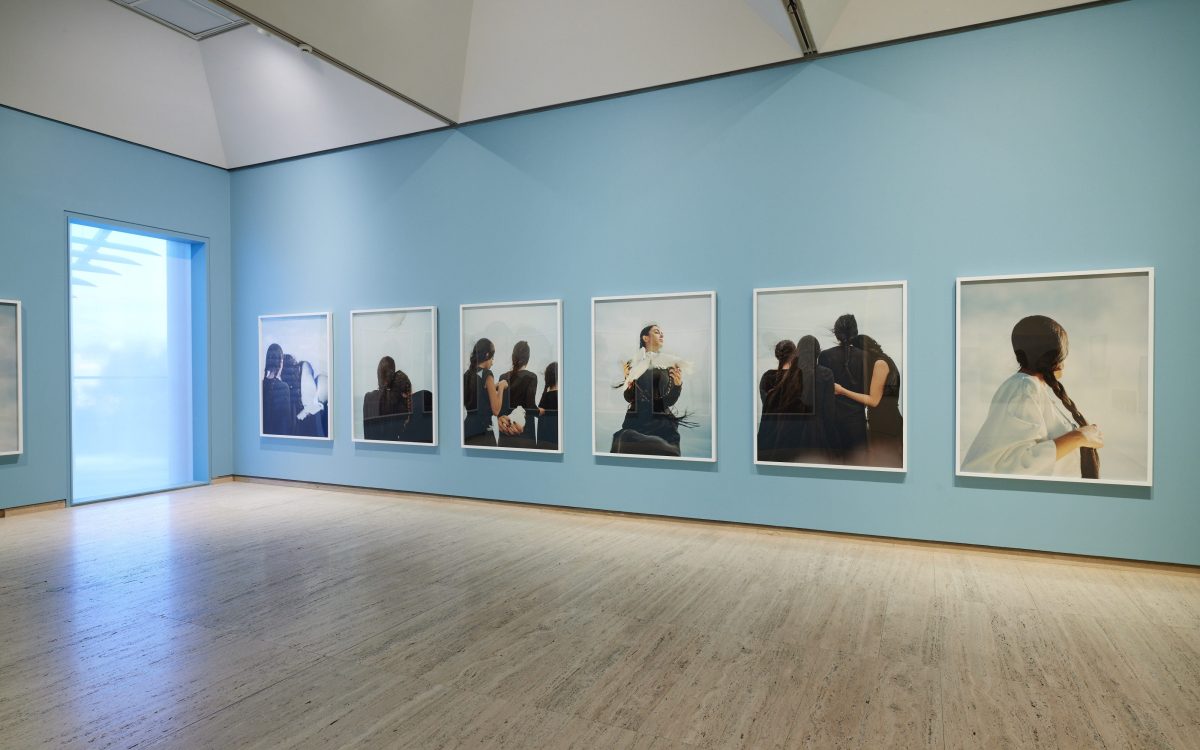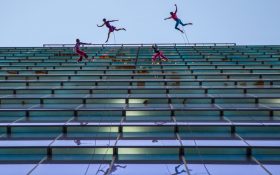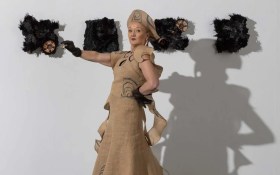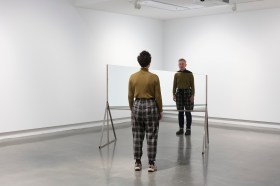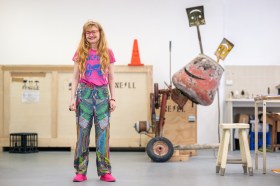It’s apt to say that the past three years have been big for Iran-born Melbourne-based artist and photographer Hoda Afshar. She received the Sidney Myer Creative Fellowships for outstanding talent and exceptional courage in 2021, has been shown in nearly a dozen solo and group exhibitions – including at PHOTO 2022, Monash Gallery of Art (now Museum of Australian Photography), Landskrona Foto Sweden, Aichi Trienniale 2022 in Japan, TarraWarra Biennial 2023 and The National 4: Australian Art Now at the MCA – and now has her first major solo outing at the Art Gallery of New South Wales (AGNSW).
Hoda Afshar: A Curve is a Broken Line is a dynamic mid-career survey into the past decade of Afshar’s practice, and the power she imbues through the lens to her subjects and their stories. The exhibition is organised in a way that feels like walking through a photobook, with works of varying scales – of landscapes, people and objects spanning 2014-18 – interwoven organically in the first gallery. These earlier pieces are part of an ongoing series In the exodus, I love you more, taken when Afshar returned to Iran seven years after moving to Australia. While embodying a similar visual language to Speak the Wind (2015-22) – shown in the final gallery space and the namesake of Afshar’s PHOTO 2022 exhibition – In the exodus, I love you more is laden with the dichotomy of (un)familiarity.
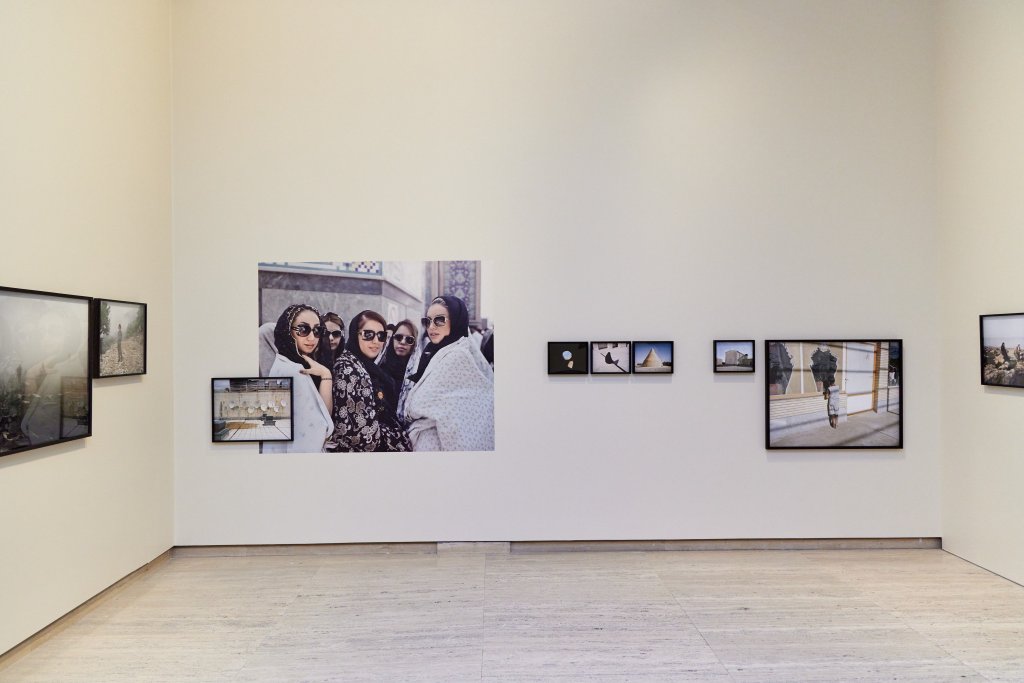
It’s not surprising to find that Afshar began her career as a photojournalist for the Hamvatan newspaper in Tehran, Iran. Social and political commentary is a given in much of her work, but her lens remains sympathetic, never othering. This is highlighted in sections throughout Hoda Afshar: A Curve is a Broken Line. Her portraits of stateless asylum seekers on Manus Island, Papua New Guinea, taken in 2018, display power and dignity in visibility, despite lived experiences of harshness and torment.
Equally moving is the 2016 series Behold, in which threat and intimacy rub elbow to elbow inside a bathhouse in Iran where a group of gay men seek refuge from a potential death penalty. The exhibition didactic explains how, when leaving Iran, Afshar hid the negatives inside her suitcase to avoid drawing attention from the authorities. This resulted in the photographs being affected by the airport scanner, taking on a grainy quality when developed.
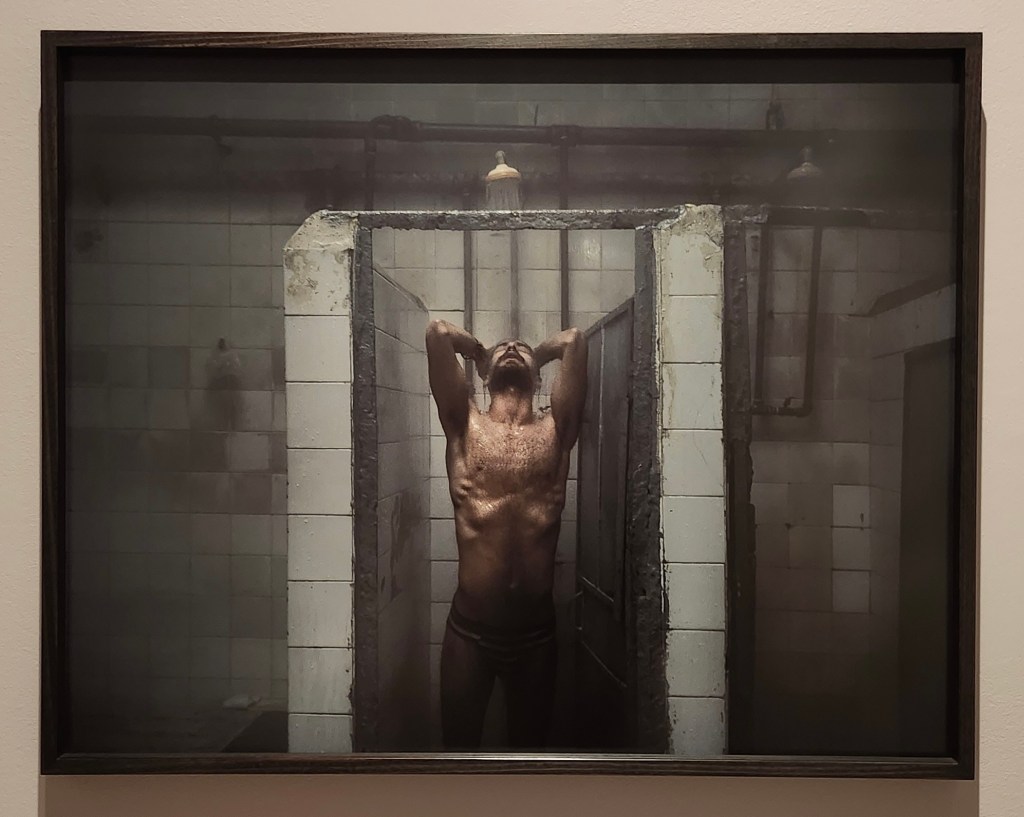
In the second gallery space, visitors are met by walls painted a powdery blue with large-sized photographs of women. In the series In turn (2023), Afshar’s lens focuses on women, their hair plaited and their hands holding white doves – imagery that instantly suggests peace and care. This new body of work is a response to the feminist protests in Iran in September 2022, ignited by the death of 22-year-old Mahsa Jina Amini who was captured by Iran’s morality police for “improperly” wearing her hijab.
Afshar was one of the first artists to respond when she created a six-part installation for MuseumsQuartier Wien in October 2022. In contrast, In turn signals the more tranquil moments of reflection following that fire of anger and despair in immediate reaction to the killing. The photographs feature Iranian Australian women who have witnessed the uprising from afar, signalling the need for strength and connection, as well as collective empowerment.
The interlinking corridors between Remain, Behold and the space holding Agonistes (2020) make for a series of intense encounters with Afshar’s subjects. The series Agonistes, featuring whistleblowers against Australian institutions, was first commissioned as part of PHOTO 2021 and shown outside St Paul’s Cathedral, Melbourne. These photos appear like marble busts to help conceal the subjects’ identity, with a note at the bottom detailing how each of them has spoken out against injustice, and is often facing the consequences of that very system of injustice. The film, containing spoken testimonials, is chilling, with interviewees cropped out to only reveal one eye or a lip in an act of protection against identification.
Apart from underscoring these significant bodies of work, what the exhibition does well is give viewers breathing room from these all-consuming experiences. Beauty and poetry in curated spaces housing In turn and Speak the Wind soften the blow of violence, despair, pain and trauma presented in the stories captured by Afshar.
This is not only about care for the artist and the people in her works, but also care for visitors of the exhibition. What Hoda Afshar: A Curve is a Broken Line doesn’t include are some of Afshar’s staged photographs from the series Under Western Eyes (2013-14) that are more tongue-in-cheek. Yet this feels like a considered decision, exemplifying how her practice has matured while still carrying forth that visual pull – aesthetically, intellectually and emotionally.
Read: Exhibition review: David Sequeira and Renee So, UNSW Galleries
Hoda Afshar: A Curve is a Broken Line is a grounding moment for a mid-career artist; it’s a deserving presentation of an artist at the forefront, who uses her art to provoke, communicate and advocate for change.
Hoda Afshar: A Curve is a Broken Line is on view from 2 September 2023 to 21 January 2024 at Art Gallery of New South Wales, South Building; free.
